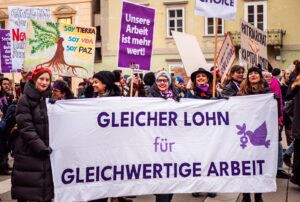Analysis from our member organisation transform!austria on the political landscape in Austria and the efforts of the Austrian left for renewal.
In Austria, the elections to the European Parliament in May this year will take place in the context of a massive shift to the Right since, in winter 2017, the government coalition between the Austrian People’s Party (ÖVP) and the right-wing extremist Freedom Party (FPÖ) came into power. Thus, Austria can be considered a prototypical example of right-wing change relevant also on a European level.
This development shows that the rise of right-wing extremists in coalition with the conservatives that have shifted to the Right is also the result of a void on the side of the Left. The established parties of the so-called “centre-Left” have lost credibility and trust due to their actions in the past. Parties left of Social Democrats and Greens did not have a chance in past decades and, with a few exceptions, remained below the threshold of perception. Although civil society movements and initiatives exist as an antithesis to the shift to the Right, they are either too weak or have only rarely stepped out of the shadows of the centre-Left political camp. Partly, there are strong personal intersections and the influence of the parties is still high. Therefore, the government’s unsocial measures and scandals did not harm the right-wing government coalition, on the contrary. Underpinned by an atmosphere of social chauvinism and racism, again and again refuelled by the government, the government majority remains stable. If anything, the government’s approval ratings since the national parliamentary elections have increased. Although the parties in government were divided with regard to questions of European politics, we also witness increasing convergence here.
The German-National Party in the Austrian Government
Compared to other right-wing populist or -extremist parties in Europe, it is the German-nationalist orientation of its nationalism characteristic of the Freedom Party (FPÖ) that must draw our attention. This lends a European dimension to the gain in influence in national politics of the Freedom Party (FPÖ), which can be illustrated by the part the FPÖ plays in the formation of a right-wing faction in the European Parliament. It upholds friendly relations to the Italian Lega and the German AfD. So far, the right-wing extremists have not suffered any losses due to their joining the government coalition and there are prognoses of them even increasing their votes in European Parliament elections in May. Currently, the FPÖ is represented in the European Parliament with four seats. As far as the Austrian People’s Party (ÖVP) is concerned, we observe a shift to the Right since the party’s leadership was taken over by the present Federal Chancellor Kurz, a shift which can be seen in Kurz’s conversion to and support of anti-migrant positions held by other EU-member states, for example of the so-called Visegrád- Group. Only after a long tug of war inside the party, the former top candidate and representative of the moderate wing of the ÖVP could assert his role as number one on the list. The second on the list, however, is a candidate loyal to Kurz. The conservatives can expect slight gains in votes. In the 2014 elections, the ÖVP, reaching 27%, remained the party with most votes and now holds five seats in the European Parliament.
Centre-Left Is Slightly Losing
The Social Democrats are mostly engaged in defining their new role of opposition, in interior politics attract attention with a zigzag-course and have exchanged their chairperson after the last parliamentary elections. The new chairperson is attested weak leadership qualities and is confronted with the task of finding a stand against the diverging tendencies in the party and male-dominated party structures. Also, the Social Democratic top candidate for the EU-elections appears somewhat inconspicuous. Appealing to the segment of the leftist voters, and as a kind of alibi, the chairperson of the Socialist Youth organisation runs as a candidate in the top ranks of the list. In opinion polls there are only slight gains for the Austrian Social Democrats who currently hold five seats in the European Parliament, the same number as the ÖVP. The Austrian Greens who suffered a resounding defeat in the last Austrian parliamentary elections, when they fell back under the 4%-threshold and are thus no longer represented in the Austrian parliament, are in the EU-elections led by their current party spokesman. They are prognosed with losses for the European elections, although one or two seats are in the European Parliament considered possible (currently they are holding three).
The NEOS party, the Austrian representative in the liberal ALDE-faction of the EU-Parliament, remains stable at 8-9%, which is about the same percentage of votes as in 2014.
KPÖ PLUS – European Left, Open List
As far as the Austrian radical Left, i.e. parties and movements left of the Social Democracy and Greens, is concerned, a lack of interest and even rejection of the EU and, consequently, the elections mark the picture. Thus, the strongest organisational branch in the provinces of the Communist Party of Austria (KPÖ), i.e. the Styrian organisation, has as far as election results are concerned, from the start opposed the CPA’s standing for European Parliament elections. In spite of this, the CPA has decided for running as “KPÖ PLUS – European Left, Open List”. Currently we are still busy overcoming the obstacle the electoral law contains for small parties and struggling for a place on the ballot paper. To make this possible, 2,600 signatures have to be collected attested by the local authorities. This is a huge effort, since not only the marginalised and fragmented situation of the radical Left in Austria but also the Austrian electoral law are not in favour of our candidature. In the last EU-elections the CPA stood in an alliance with the Pirate Party and “Der Wandel” which called itself “Europa Anders”. At 2% of the votes, the success of the list was quite moderate, albeit an increase compared to the CPA’s usual results in national parliamentary elections of about 1% of the votes. Exploratory talks and efforts to bring about another broad left alliance failed due to a lack of interest, e.g. among the civil society spectrum, and the non-existence of other groups and parties. Under these preconditions it must already be rated a success if we ensure our candidature for European elections.
As regards its election issues, the CPA considers itself a modern European Left with an internationalist and feminist focus. The top candidate will be Katerina Anastasiou, who is a Greek citizen and not a party member. Among the first ten places on the list six out of ten are women, four out of the ten come from EU-countries other than Austria and only four were born in Austria. In the beginning of March, the main priorities of KPÖ PLUS for the EU-election campaign were presented in a press conference. The focus and positions comprise an unmistakable standpoint regarding human rights and the walls-up politics, an eco-socialist transformation and radical system change, a clear opposition to the right-wing authoritarian turn and the emerging neo-fascism.
Cover photo source: fb page of KPÖ Plus



